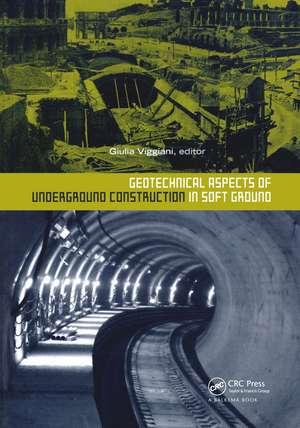Geotechnical Aspects of Underground Construction in Soft Ground
Editat de Giulia Viggianien Limba Engleză Hardback – 5 sep 2012
The symposium was organized by the Technical Committee TC28 “Underground Construction in Soft Ground” of the International Society for Soil Mechanics and Geotechnical Engineering (ISSMGE). This is the latest in a series which began in New Delhi in 1994, and was followed by symposia in London (1996), Tokyo (1999), Toulouse (2002), Amsterdam (2005), and Shanghai (2008). The Rome symposium was organised by the Italian Geotechnical Society (AGI), under the auspices of the International Society for Soil Mechanics and Geotechnical Engineering (ISSMGE) and the Italian Ministry for Public Works, and sponsored by various national and international companies.
Geotechnical Aspects of Underground Construction in Soft Ground includes contributions from 30 countries on research, design and construction of underground works in soft ground. The contributions cover:
- Construction, design, and measured performance of bored tunnels
- Physical and numerical modelling of deep excavations and bored tunnels
- Construction, design, and measured performance of deep excavations
- Design methods and predictive tools for deep excavations and bored tunnels
- Ground movements, interaction with existing structures and mitigation measures
- Activities of TC204 working groups
The general reports give an overview of the papers listed in the symposium’s technical sessions. The proceedings include the written version of the four invited lectures covering topics ranging from the geotechnical aspects of construction of the new Mexico City deep sewerage system (as a special contribution of TC214 “Soft Soils”), to the long-term settlement mechanisms of tunnels in Shanghai, the lessons learned from the deep excavations for the North-South Line in Amsterdam, and the evaluation of the effects of tunnel excavation on historical buildings, drawing on experience gathered during construction of subway line C in Rome.
Similar to previous editions, Geotechnical Aspects of Underground Construction in Soft Ground represents a valuable source of reference on the current practice of analysis, design, and construction of tunnels and deep excavations in soft ground. The book is particular aimed at academics and professionals interested in geotechnical and underground engineering.
Preț: 1986.38 lei
Preț vechi: 2813.29 lei
-29% Nou
Puncte Express: 2980
Preț estimativ în valută:
380.21€ • 413.14$ • 319.59£
380.21€ • 413.14$ • 319.59£
Comandă specială
Livrare economică 31 martie-14 aprilie
Doresc să fiu notificat când acest titlu va fi disponibil:
Se trimite...
Preluare comenzi: 021 569.72.76
Specificații
ISBN-13: 9780415683678
ISBN-10: 041568367X
Pagini: 1100
Dimensiuni: 174 x 246 mm
Greutate: 1.86 kg
Ediția:New.
Editura: CRC Press
Colecția CRC Press
ISBN-10: 041568367X
Pagini: 1100
Dimensiuni: 174 x 246 mm
Greutate: 1.86 kg
Ediția:New.
Editura: CRC Press
Colecția CRC Press
Public țintă
Postgraduate, Professional, and UndergraduateCuprins
Preface, Organisation, Sponsors, Special lectures, Keiichi Fujita lecture, Session reports, Construction, design, and measured performance of bored tunnels, Physical and numerical modelling of deep excavations and bored tunnels, Construction, design, and measured performance of deep excavations, Design methods and predictive tools for deep excavations and bored tunnels, Ground movements, interaction with existing structures and mitigation measures, Activities of TC204 working groups
Descriere
Including contributions on research and the design and construction of underground works in soft ground, the main topics of this book are construction, design, and measured performance of bored tunnels; physical and numerical modelling of deep excavations and bored tunnels; construction, design, and measured performance of deep excavations; design methods and predictive tools for deep excavations and bored tunnels; and ground movements, interaction with existing structures, and mitigation measures.
